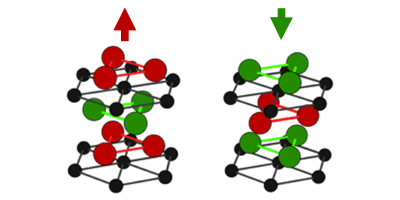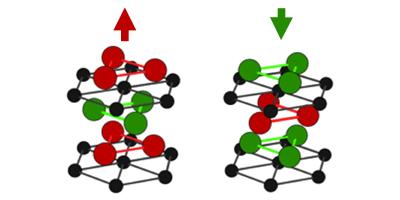Skin-Deep Spintronics
Spintronics is a portmanteau word that refers to the utilization of spin, rather than charge, in electronic devices. In order for spins to be used in this way, the spin-up and spin-down states in a material have to be separated in energy, and, like for conventional electronics, the material should be ambipolar, meaning both negative (electron) and positive (hole) charges have to conduct.
To meet these criteria in a single material, researchers have focused on doped semiconductors, but they have been limited to working with very pure samples or at temperatures far below those considered technologically relevant. In Physical Review Letters, Alberto Crepaldi, at the Swiss Federal Institute in Lausanne, and colleagues propose a surface science approach to selecting for a particular spin state in crystalline .
consists of alternating layers of bismuth, tellurium, and iodine, and the electrons in this material experience a strong spin-orbit interaction, which causes a large separation of spin states. Previous photoemission experiments have revealed that spin-up and spin-down states are separated by a large energy, but the study by Crepaldi et al. goes a step further in identifying two types of surface states, associated with whether the crystal terminates with a tellurium or iodine layer. The team shows they can move the chemical potential from the conduction band to the valence band by controlling the surface termination, which is equivalent to selecting either spin-polarized electron or hole states as the conducting states. By controlling the surface of thin films of , the team raises the possibility of patterned devices with different terminations for spintronic applications. – Daniel Ucko





